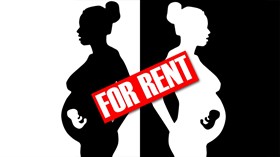
Source: Image by Alejandro Migueles Osuna
New health guidance encourages low-risk pregnant women to have a home birth or to attend a midwife-led unit. In both cases medical doctors are not involved. Do you think home birth or midwife units are a right choice? Better than giving birth in a hospital? Share your experiences and vote! (see below)
Giving birth at home?
Parents want the best for their babies. Home birth has become a choice in developed countries. Although most women choose to give birth in hospitals, the UK government is trying to promote home births. Generally in developed countries, planned births at home, in hospital and in midwife-led units all carry a low level of risk. However, although risk is low it seems that there are discrepancies between home and hospital birth.
Home birth vs hospital birth: scientific evidence
A US nation-wide study over 13 million births on a 3-year span (2007-2010) found that births at home were roughly 10 times as likely to be stillborn (14 times in first-born babies) and almost four times as likely to have neonatal seizures or serious neurological dysfunction when compared to babies born in hospitals. Both baby's and mother's higher mortality rates are associated with the inability to timely assist mothers with emergency procedures in case of complications during labor. A UK study shows that when the researchers focused solely on women planning to have their first baby at home, they found they were almost three times more likely to suffer complications than if they went to hospital.
It's important to note, however, that even this raised risk equated to a low chance of serious complications. The latest clinical guidelines of the British National Institute for Health and Care Excellence (NICE) state that home births and midwife-led centres were better for mothers and often as safe for babies. These guidelines indicate that women who have previously given birth and who are expected to have a straightforward pregnancy should be told home birth, or birth in a unit run by midwives, is safer for them than going to hospital.
Home birth pros and cons
Pros of home birth
- More natural, less medical intervention: when parents decide to give birth at home they can expect lower incidence of medical intervention. In hospital women are shaved, their waters sometimes broken, they get medication, fetal monitoring and sometimes even epistomies.
- Privacy: women giving birth at home can preserve much more their privacy by controlling those who will share with them these tense and special moments.
- Familiarity and comfort: women feel more comfortable at home, they can plan and arrange things in their preferred way. They can decide where to have things they think may be useful for them during birth, such as water, towels, clothing, etc.
- Mobility: although in most cased it is recommended that women move during labor, in hospitals this is not always possible. When women are giving birth at home they can have more freedom and space than in a hospital room.
- Lower risk of infections: in hospitals there are many germs and there is always the danger than the mother or the baby get an infection there. Mothers and babies can be safer at home.
- More quiet and pleasant recovery: after labor women may recover better at home than at a hospital, where they have to follow much more strict rules and do not enjoy the same level of attention or space as at home.
- Home births are cheaper: medical attention and medicaments are expensive. By giving birth at home families are saving taxpayers money (or their private insurances) money.
- Less disruptive for family life: home birth is compatible with taking care of other older children, elderly or pets and with the usual household chores. Spending a couple of days in a hospital can be very disruptive for family lives.
Cons of home birth
- Higher risk in case of labor and delivery complications: giving birth home entails some risks. Although most healthy mothers do not experience any major problem during the birth, some do. Being in a hospital in case something goes wrong is a big advantage and increases the chances of solving the problem. Imaging the case in which an emergency cesarean section is needed. Homes are not always close to hospitals and a transfer to it can be very difficult in the middle of labor. Being at a hospital in case of an emergency could mean the difference between life and death.
- Lower postpartum help: in some cases newborns have some problems which were not detected during pregnancy and require immediate medical care. Having to drive the baby to a hospital after birth can be problematic. In some cases there is not such a problem, but parents may have some unfounded suspicion which could be easily ruled out by a doctor, if they were in a hospital.
- Access to anesthesia and medication: many women prefer not to have any sort of anesthesia, however, when facing very severe pain, often they change their mind. In a hospital mothers can request an epidural or some medication during labor. Women giving birth don't have that chance to mitigate extreme pain.
- Privacy: depending on the type of house, family and culture giving birth home can not be as private an experience as desired by parents. Relatives and neighbours can become a problem, sometimes even when they try to help.
- Impact on family and home routines: a home births can also have a strong impact on those living there. Sheets will be bloodied, the mother is likely to shout and cry during the delivery, there will be a high degree of general stress, etc. Small children, the elderly and pets living at home may find the experience very stressful.
- Cost of emergencies: although usually natural births at home are cheaper, in case of complications or an emergency the cost of activating a team of doctors and nurses last minute can be very high.
- Peace of mind: since one can never rule out the possibility of a complication during labor and delivery, for many parents knowing that they are in a hospital surrounded by pediatricians, anesthesists and obstetricians is a real advantage since it can help them reduce their stress levels.
In brief, there many arguments in favor and against home birth and mixed evidence concerning the risks of home and hospital birth. We have all heard both horrible and wonderful birth stories. But what do you think is the best for the baby and the parents? Vote in our poll and share your experiences and recommendations (below)
Watch these videos outlining pros and cons of home birth
If you change your mind, you can change your vote simply by clicking on another option.
New to netivist?
Join with confidence, netivist is completely advertisement free. You will not receive any promotional materials from third parties.
Join the debate
In order to join the debate you must be logged in.
Already have an account on netivist? Just login. New to netivist? Create your account for free.
You are viewing a filtered list of comments. Click the button above to view all comments.
I agree with you in general. I would be careful with the cat analogy, though. I think human birth is not as straightforward as in other mammals. Our heads are too big and women hips very small, so it's difficult for a woman to give birth completely without assistance. But it's true that from a hormonal perspective, a good connection to our "animal instincts" in labour is very important. The body responds better when the woman giving birth is in tune with her instincts, and that is difficult to do in a hospital surrounded by strangers who tell you what to do.
I find it very strange to compare cat's birth with human's birth... Over 99% of cats give birth with no problems... this is clearly not the case for women. They also give birth to multiple kitten (4-5), which is extremely rare for humans... Gestation (pregnancy time) is about 64 days for cats, a bit longer for women... Female cats can give birth about 3 times a year... an average of 150 kitten in about 10 years... Be careful with non sense comparisons. Yes we are also animals, but it doesn't mean we are similar...
Excellent comment, t
he argument about the self selection (or actually the opposite) due to the public discourse on fear is a very good one that actually may make more difficult to get reliable statistically significant discrepancies in both types of births.
"A UK study shows that when the researchers focused solely on women planning to have their first baby at home, they found they were almost three times more likely to suffer complications than if they went to hospital (2). "
This is entirely misleading. "almost 3x times more likely to suffer complications"... the figures are 5 in 1000 women changing to 9 in 1000 women. experienced the most serious outcomes that were looked at when comparing home birth to hospital birth. Comparing Midwife led unit birth to obstretric hospital birth the figures are the same - 5/1000 so there's NO benefit to hospital for any low risk woman, statistically (unless she wants to be there). This was for the most serious outcomes although it's often reported as being for baby deaths. In fact, there was no statistically significant difference in baby deaths but outcomes such as meconium aspiration syndrome, which most babies recover fine from, was included.
Let's look at some other stats. For low risk women having their second or subsequent babies planning a home birth, rates of caesarean birth were 7 women in 1000. For the same group of women planning a hospital birth - absolutely the same starting point other than planned place of birth - 35 women had a caesarean birth! That's a FIVE TIMES greater risk of CS birth by planning to birth in hospital rather than at home. That's outrageous.
Let's look at blood loss - a bit concern for some people looking at home birth. Women who planned to birth at home were HALF as likely as women who planned to birth in hospital to have blood loss requiring a blood transfusion. TWICE as likely to have a major PPH in hospital. That's a serious outcome in the mother! Interestingly - these figures are almost exactly the same as the figures for serious outcomes in the baby - 5 in 1000 for home birth and 8 in 1000 for hospital birth. So again, like the off-spouted figures for the risks to the baby of home birth, the actual risk is immensely tiny. But statistically, the same as the PPH risk. So why not mention this? Women who don't want to take the risk of birthing at home because they've been frightened by the quoted 3x risk to their baby should know they have the same risk of losing so much blood that they need a transfusion if they go to hospital.
Fundamentally, what this guidance tells us is what we've known for years - homebirth is a perfectly valid choice, as safe as birth can be, for many women.
If you had a cat in labour, would you immediately whisk her up, throw her into the car, drive at full speed to the vet's put her on the table on her back with straps round her, stick your finger up her vagina to see whether those darned kittens are coming, shout at her to push, berate her for making too much noise, shine lights at her, have people coming in and out... or would we find her a dark, soft, private corner and watch and wait closely, respecting her body's amazing ability but being on hand to help fast if things didn't work out to plan?
We're all animals, you know.
Join the debate
In order to join the debate you must be logged in.
Already have an account on netivist? Just login. New to netivist? Create your account for free.



















